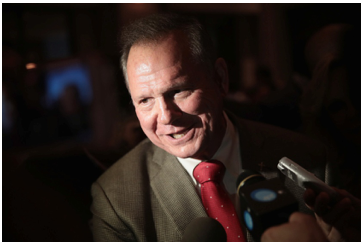Comments
GUEST WORDS--Two things are clear about the recent spate of accusation of and confessions by men for sexual harassment and assault: First, they seem to know no ideological borders; liberal men seem no more or less likely to commit such offenses than conservative men are. Second, liberals and conservatives treat these offenses radically differently. But why?
We do not have perfectly analogous cases, of course. The major figures on the right recently accused of sexual assault or harassment include Roy Moore, the Republican nominee for Alabama's seat in the United States Senate, and President Donald Trump himself. The major figures on the left largely come from the entertainment sphere. These include producer Harvey Weinstein, actor Kevin Spacey, and comedian Louis C.K.
That's not to say there have been no Democratic officeholders accused of such improprieties. Former Congressman Anthony Weiner began a 21-month prison term last week. A Colorado legislator is currently being pressured to resign by his party's leaders for making sexual advances on staff members.
Former President Bill Clinton has been accused of considerably worse acts, and Democrats' efforts to protect him during his impeachment and trial are looking far less honorable with the passage of two decades. My guess is that his party would treat him far differently today, but it's difficult to know. For the purposes of this piece, however, I'd like to focus on this year's events and accusations that have been in the national news. And please note that I am not claiming that Hollywood is an arm of the Democratic Party. It isn't. But the fact is, those entertainment figures recently accused of these sexual predations are aligned with liberal causes.
It is difficult to directly compare politicians to people employed in the entertainment industry, even if their offenses are similar. Politicians largely operate in a two-party, zero-sum environment—Moore's withdrawal from the race, for example, would likely hand Democrats a seat in a closely divided Senate. There's a strong incentive to close ranks when the stakes are so high. The stakes are far lower for getting rid of a criminal Hollywood producer; another will rise. And, of course, there are important differences between public office and private business.
But this doesn't explain all the differences we see between the parties. Trump, notably, could have been replaced prior to the election by someone with a better chance of winning. He could still be removed and replaced by another Republican today, although the Republicans who could make that happen have expressed all of zero interest in doing so.
There are some important parallels between Washington and Hollywood, as well. Both worlds respond to pressure from elites (party leaders, activists, and donors in one; producers and directors in the other) as well as the masses (voters in one; moviegoers and television viewers in the other).
The differences are telling. When the Access Hollywood tape surfaced in October of 2016, and more than a dozen women came forward to claim that Donald Trump had assaulted them, many Republican elites felt compelled to issue statements. They professed some disgust, and some even suggested it was time to think about replacing their presidential nominee. Few directly called for Trump to step down, however, and most of those who did said they were more worried about losing the election than about electing a sexual predator. For the most part, Republican leaders waited to see what the reaction of the masses was, and when the polls didn't turn sharply against the Republican ticket (no doubt in part because the top GOP politicos weren't leading the way on that front), Republican elites relaxed. They perhaps never fully embraced Trump again, but they nonetheless urged people to vote for their ticket, including Trump, and called his election a great day for the country.
The events surrounding Roy Moore have followed a similar path. Like Trump, Moore wasn't the nominee most Republican leaders wanted. But when he was accused of statutory rape, many defended him. The Alabama state auditor claimed Biblical justifications for Moore's actions; other Alabama GOP leaders questioned the motives and veracity of Moore's accusers. Some Republican leaders said Moore should step down only if the accusations turned out to be true. Importantly, recent presidential nominees Mitt Romney and John McCain (R-Arizona) offered no such qualifiers in their denunciations of Moore, and Senate Majority Leader Mitch McConnell has called for Moore to step down. But in the cases of both Trump and Moore, Republican leaders were largely willing to defer moral judgment to the masses, essentially saying, "If voters won't vote for these people, then so be it, and if they will, who are we to judge?"
 Hollywood liberals could have chosen this path. Industry leaders could have reasoned, "Our customers know what Weinstein and Spacey did, and if they don't want to watch their films and shows, they don't have to—let the market decide." But instead they have ostracized Weinstein, Spacey, and C.K. Weinstein was removed from his own company. Spacey was fired from House of Cards and several other projects. FX Networks and FX Productions ended their relationship with Louis C.K. and fired him as executive producer of various shows. Even outside what law enforcement has done and may still do, these men's careers are substantially injured and possibly at an end.
Hollywood liberals could have chosen this path. Industry leaders could have reasoned, "Our customers know what Weinstein and Spacey did, and if they don't want to watch their films and shows, they don't have to—let the market decide." But instead they have ostracized Weinstein, Spacey, and C.K. Weinstein was removed from his own company. Spacey was fired from House of Cards and several other projects. FX Networks and FX Productions ended their relationship with Louis C.K. and fired him as executive producer of various shows. Even outside what law enforcement has done and may still do, these men's careers are substantially injured and possibly at an end.
Why the differences? One thing we really mustn't ignore is gender. Women simply have a far greater presence and voice in the Democratic Party than they do in the Republican Party. There are 105 women in the U.S. Congress, 78 of whom are Democrats. A quarter of the nation's 7,383 state legislators are women, 60 percent of whom are Democrats. In 65 of the nation's 99 state legislatures, there are more Democratic women than Republican women. The Supreme Court's three female justices were all appointed by Democrats. There's a substantial difference among voters, as well—men voted for Trump last year by a 52-41 margin, while women voted for Hillary Clinton by a 54-41 margin.
The consequence of this is that, while men still dominate both parties, as well as the entertainment industry, women's voices are far more likely to be heard on the left, and men on the left are more likely to be judged harshly in their immediate circles if they tolerate sexual predation. The meager criticisms by Republican officeholders of Trump's behavior, urging protection for women because "they are our daughters and wives" (as opposed to "they are us"), were telling. Again, the presence of powerful women on the left doesn't seem to mitigate the tendency of some men to commit assault or harassment, but it does make it harder for other men to let it go, to rationalize it, to flip through the New Testament for justification, or to dismiss it as "locker room talk."
Then there's the issue of leadership: As the 2016 nomination processes across both parties demonstrated, the Republican Party is functionally leaderless. It seems to lack elites willing to make decisions regarding the party's brand or masses willing to follow such decisions. The Democratic Party has its share of problems, but elites did get the nominee it wanted last year. It may well be that American conservatism is experiencing such tumult right now that its purported leaders cannot lead or do not wish to for fear of being dethroned.
I again recognize that Washington and Hollywood are far from perfect analogues, but I believe we can learn much from recent examples of their willingness and ability to police their own.
(Guest columnist Seth Masket writes for Pacific Standard … where this column originated. He is a political scientist at the University of Denver, specializing in political parties, state legislatures, campaigns and elections, and social networks. He is the author of No Middle Ground: How Informal Party Organizations Control Nominations and Polarize Legislatures.)
-cw















